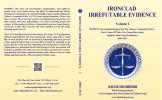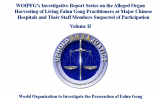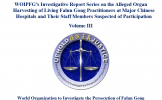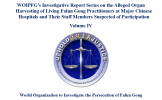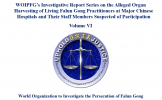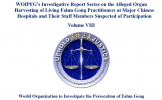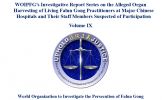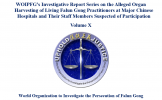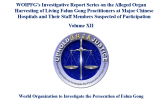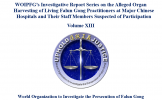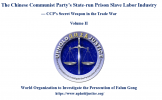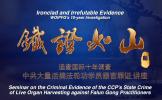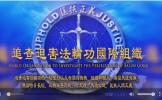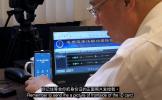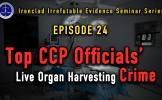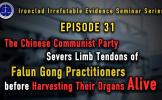Luo Gan's Role in the Persecution of Falun Gong
Overview
This report is based on evidence and third party analysis. It provides comprehensive information on Luo Gan's involvement, both as an individual and also as the Chief Executive Officer of the "610 Office" in planning and executing the persecution of millions of Falun Gong practitioners.
Before the open persecution of Falun Gong in Mainland China, Luo Gan used his power twice, once in 1997 and then again in 1998, to order the Public Security Departments in China to conduct a nationwide secret investigation by systematically planting agents to investigate and collect evidence on Falun Gong, with the intention of labelingl Falun Gong as an "evil cult" and to ban the practice. This secretive method of collecting evidence and "label guilty before a trial" is against the constitution of China. No evidence of crimes could be found related to Falun Gong. However, misled by the "notification," some local police departments in Jiangsu, Liaoning, Shandong, Xinjiang, Heilongjiang, Hebei and Fujian Provinces declared that group practice of Falun Gong exercises was "illegal gathering" and dispersed practitioners by force. They also broke into private residences and illegally searched and confiscated private property of Falun Gong practitioners.
After July 20, 1999, Luo Gan was the main executor to carry out Jiang's "genocide" policies against Falun Gong. From 1999 to 2002, Luo Gan directly participated in the making of a series of polices designed to map the escalation of the persecution. Luo Gan used every speech he made at various meetings to directly incite political and judiciary departments to step up the persecution of Falun Gong. He personally went to various places to oversee the execution of persecution orders. Between 2001 and 2003, Luo Gan gave at least seven public speeches urging the political and judiciary departments to regard "Falun Gong as the number one target for suppression." Since September 2000, Luo Gan has gone to Weifang City in Shandong Province, Wuhan City in Hubei Province, Nanchang City in Jiangxi Province, Changchun City in Jilin Province, Anhui Province, Liaoning Province, Jiaozuo City in Henan Province, Shenyang Province and Xingkaihu in Jixi, Heilongjiang Province to personally oversee the persecution. Evidence shows that whenever Luo Gan conducted an inspection somewhere, the arrest, torture and death toll of Falun Gong practitioners in that area would increase drastically.
Before the "16th Congress" in which the successor of China's top leaders would be chosen, Luo Gan strengthened the persecution to an extreme extent in order to obtain Jiang's approval to be promoted as a Politoburo Standing Committee member. In 2002, Luo Gan was picked as one of 9 members of the Politburo Standing Committee. CNN Senior China Analyst Willy Wo-Lap Lam commented:"The East Germany-trained conservative has won President Jiang's support for his tough crackdown on the Falun Gong and other "underground" organizations." [38]
As the Secretary of the Political and Legislative Affairs Committee of the CCP Central Committee, Luo Gan used the absolute power of the "610 Office" over all levels of the ruling Party, the governmental departments and judicial systems in China to intimidate and lure all the Party and governmental units, public security departments and political and judiciary system to join the persecution of Falun Gong. He not only "praised" the criminals of the persecution nationwide, "praised" the crackdown of Falun Gong practitioners peacefully appealing in Tiananmen Square, but also encouraged the notorious Masanjia Forced Labor Camp with a largae amount of money. There is sufficient evidence that many of Luo Gan's acts as an individual have overstepped his authority, and are in breach of the Constitution of the People's Republic of China as well as the United Nations Convention on the Prevention and Punishment of the Crime of Genocide (the Convention), which China has ratified.
Table of Contents (note: clicking on an item in this table of contents will jump you to its location in this report)
Overview
Background and Overview of Luo Gan and the "610 Office"
1. Secretly Labelling Falun Gong as an "Evil Cult," Conducting Secret Investigation, Harassing and Illegally Arresting and Detaining Falun Gong Practitioners
2. Actively Plotting the Suppression, Acting as the Chief Executive Officer for Jiang's Policy of Genocide
1). Actively Planning "Strike Hard on Falun Gong" at Numerous High-Level National Meetings
2). Carrying Out Jiang's "Step Up" Persecution Policies in 2000
3). Luo Gan Went to Various Places to Push the Suppression of Falun Gong
3. Intimidating Governmental Departments, and Political, Legal and Police Systems into Participating in the Persecution
1). Nationwide "Praise" of Criminals for Their Participation in Persecuting Falun Gong
2). Encouraging and Allowing Violence at Tiananmen Square
3). Personally Set Up an Example of How to Persecute Falun Gong - the Masanjia Forced Labor Camp
4). Forcing Police Departments to Get Involved in the Persecution with Promises and Threats
5). Luo Gan Went to Changchun City, Jilin Province to Launch a Frenzied Suppression of Falun Gong
4. Luo Gan's Involvement in "Tiananmen Square Self-Immolation Incident"
5. Luo Strengthens the Persecution to an Extreme Extent for Jiang抯 favor and Promotion in 16th Congress
References:
Background and Overview of Luo Gan and the 610 Office"

Luo Gan's Personal Data: a native of Jinan, Shandong Province, who has held the following positions:
- Vice-Governor of Henan Province
- Secretary of the CPC Henan Provincial Committee
- Secretary of the Political and Legislative Affairs Committee of the CPC Central Committee
- State councilor and member of the Leading Party Members' Group of the State Council.
Luo Gan was the Secretary of the Political and Legislative Affairs Committee of the Chinese Communist Party (CCP) Central Committee. He is also the founding member and Chief Executive Officer of the Jiang regime's specialized agency to persecute Falun Gong - "the Leadership Team Office on the Issue of Falun Gong" of the CCP Central Committee - that is also called the "610 Office". During nearly five years of brutal persecution, Luo Gan has thoroughly planned, deployed and directed Jiang's annihilation policies and played a major role in the Jiang regime's persecution of Falun Gong. In 2002 he became a member of the Politburo Standing Committee member of CPC Central Committee.
The “610 Office”
The full name of the "610 Office" was "the Leadership Team Office on the Issue of Falun Gong." Under the personal direction of Jiang Zemin, that office structure was established on June 10, 1999 and has since then been known as the "610 Office." It is the decision-making and enforcing agency under the Chinese Communist Party's (CCP) "Leadership Team on the Issue of Falun Gong." It is a permanent office under the Political and Legislative Affairs Committee of the CCP Central Committee, controlled by Luo Gan, the Secretary of the Political and Legislative Affairs Committee. It systematically carries out Jiang's orders of "defaming their reputation, bankrupting them financially, destroying them physically."
The "610 Office" is the highest-level governmental agency that Jiang's regime uses to persecute Falun Gong. Since 1999, the "610 Office" became a strict and independent system with absolute power over all levels of the ruling Party, the governmental departments and judicial systems in China. It orders and monitors various parts of the government machinery, including overseas Chinese consulates and embassies, to actively participate in this political persecution against Falun Gong. As it does nothing but political persecution and is completely above the law, it has a lot in common with the former "CCP Central Committee Cultural Revolution Leadership Team." It has been compared to the Nazi Gestapo.
1. Secretly Labeling Falun Gong as an "Evil Cult," Conducting Secret Investigation, Harassing and Illegally Arresting and Detaining Falun Gong Practitioners
Before Jiang's group began the public persecution of Falun Gong, Luo Gan used his power twice, once in 1997 and then again in 1998, to order the Public Security Departments in China to conduct a nationwide secret investigation by systematically planting agents to investigate and collect information about Falun Gong, with the intention of labeling Falun Gong as an "evil cult" and banning the practice.
At the beginning of 1997, when the Chinese people and government officials at various levels still supported Falun Gong, Luo Gan ordered the Public Security Departments to conduct a nationwide, secret investigation of Falun Gong. The investigative reports from the local police, however, reported, "No problems found" or "No problems yet found." Investigation reports from sports committees in various places also concluded that Falun Gong was a practice of "strengthening health, keeping fit and is capable of curing illnesses," and there was no illegal conduct by Falun Gong. Luo Gan's scheme to defame Falun Gong was forced to a halt.
In July 1998, through the First Bureau of the Chinese Ministry of Public Security (a.k.a. Political Security Bureau), Luo Gan issued Public Authority [1998] # 555 "Notification about conducting investigation of Falun Gong." This document first named Falun Gong an "evil cult," then ordered the police departments across the country to systematically plant agents to investigate and collect evidence. However, no evidence of crimes could be found related to Falun Gong. Misled by the "notification," some local police departments in Jiangsu, Liaoning, Shandong, Xinjiang, Heilongjiang, Hebei and Fujian Provinces declared that group practice of Falun Gong exercises was an "illegal gathering" and dispersed practitioners by force. They also broke into private residences, and illegally searched and confiscated private property of Falun Gong practitioners. The police unlawfully arrested, detained and physically assaulted practitioners, and used all propaganda media to defame and slander Falun Gong. [1]
2. Actively Plotting the Suppression, Acting as the Chief Executive Officer for Jiang's Policy of Genocide
After July 20, 1999, Luo Gan was the main executor carrying out Jiang's genocidal policies against Falun Gong. From 1999 to 2002, Luo Gan directly participated in the making of a series of policies designed to map the escalation of the persecution. Luo Gan used every speech he made at various meetings to directly incite political and judiciary departments to step up the persecution of Falun Gong. He personally went to various places to oversee the execution of persecution orders. Between 2001 and 2003, Luo Gan gave at least seven public speeches urging the political and judiciary departments to regard "Falun Gong as the number one target for suppression." Since September 2000, Luo Gan had gone to Weifang City in Shandong Province, Wuhan City in Hubei Province, Nanchang City in Jiangxi Province, Changchun City in Jilin Province, Anhui Province, Liaoning Province, Jiaozuo City in Henan Province, Shenyang Province and Xingkaihu in Jixi, Heilongjiang Province to personally oversee the persecution. Evidence shows that whenever Luo Gan conducted an inspection somewhere, the arrest, torture and death toll of Falun Gong practitioners in that area would increase drastically.
1). Actively Planning "Strike Hard on Falun Gong" at Numerous High-Level National Meetings
Luo Gan deployed the large-scale systematic persecution of Falun Gong at the meeting of the national political and judiciary systems and at the meeting of the Central Comprehensive Management Committee. He also used every opportunity at other national meetings to defame and attack Falun Gong.
On January 20, 2001, Luo Gan hosted a "Strike Hard" meeting, instructed local officials to arrest and severely punish more enemy forces, ethnic subversive groups and religious groups in and outside of China, including Falun Gong. [2]
On June 28, 2001, at the 14th Plenary Session of the Standing Committee of the 9th Chinese People's Political Consultative Conference, Luo Gan proposed to "deepen the struggle against Falun Gong...organization and quickly implement the 'Strike Hard' campaign." [3]
On December 5, 2001, in a speech at the National Political and Judiciary Work Meeting, Luo Gan labeled Falun Gong a "hostile force inside and outside of China" and called for a further "Strike Hard Campaign" directed at Falun Gong [4]
On January 19, 2002, before the 16th National Congress of the CCP, Luo Gan again gave "strike hard" orders. Luo Gan made an emphatic point at the 1st Plenary Session of the Central Comprehensive Management Committee to "continue to strike hard against Falun Gong." [5]
In the afternoon of March 6, 2002, Luo Gan said in Beijing during his speech at the meeting of the Fujian Province representative group, "This year, work in several aspects must be well taken care of: the first is to firmly strike down enemy forces... second is to firmly strike down 'Falun Gong' activities." [6]
On September 16, 2002, at the national TV-teleconference of the CCP Political and Judiciary Committee, Luo Gan gave orders to "guard against and strike hard against enemy forces inside and outside of China" and Falun Gong was on top of the list. [7]
According to the report sent to Minghui Net from Falun Gong practitioners in Qionglai City, Sichuan Province, "Only a few minutes after Luo Gan clamored during the evening TV news on September 16th to 'focus on the crackdown of Falun Gong,' the police department in Qionglai City dispatched a large number of officers to round up Falun Gong practitioners." Under this order by Luo Gan, many practitioners around the country had their homes ransacked, and many were arrested.
Xinhua Net reported on January 13, 2003, "the Central Comprehensive Management Committee held a meeting in Beijing that day, assessing the main work points for year 2003 national comprehensive management work." Luo Gan personally instructed how to further persecute Falun Gong during the Chinese New Year and the "two national congresses," i.e. the National People's Congress and the People's Political Consultative Conference. [8]
Listed above are only portions of Luo Gan's public speeches that resulted in the escalation of the persecution of Falun Gong, as collected by the World Organization to Investigate the Persecution of Falun Gong (WOIPFG). More evidence will be directly provided to the court trials.
2). Carrying Out Jiang's "Step Up" Persecution Policies in 2000
According to WOIPFG, persons in the know revealed that Luo Gan had a conversation regarding the "Falun Gong issue" with Jiang Zemin in late 1999 in the early phase of the persecution. Soon afterwards, in 2000, when Luo Gan went to various places in China (including Xinjiang), he passed on Jiang Zemin's secret orders regarding Falun Gong practitioners, "Defame their reputation, bankrupt them financially, destroy them physically" and "annihilate Falun Gong within three months." [9]
The Committee for Investigation on Persecution of Religion in China and Free China Movement, both based in the United States, published a secret CCP document, which states the police need no arrest warrant when arresting Falun Gong practitioners. This document was issued by the Public Security Department in Jilin Province and by the High People's Court of Jilin Province, "Regarding Falun Gong...the striking force must increase, whenever [Falun Gong practitioners] are discovered, arrest first and then go through procedures." This document also clearly stated the order takes effect beginning on May 20, 2000 and ends on December 30, 2007. [10]

Fig. 2 A secret document issued by Public Security Department in Jilin Province and High People's Court of Jilin Province to local courts and police departments states, "No arrest warrant is needed when arresting Falun Gong practitioners."
A secret document issued by Public Security Department in Jilin Province and High People's Court of Jilin Province to local courts and police departments states, "No arrest warrant is needed when arresting Falun Gong practitioners."
In early September 2001, the "610 Office" headed by Luo Gan issued an order, "It's allowed to secretly arrest and detain Falun Gong practitioners; those police officers who spot Falun Gong practitioners but do not arrest them will be fired and their household registration will be suspended." The "610 Office" issued various secret orders on persecuting Falun Gong, which was responsible for the rapid rise in the numbers of torture deaths of Falun Gong practitioners. [11]
According to a report from the Falun Dafa Information Center on October 4, 2001, more than 20 Falun Gong practitioners died in custody in the last two weeks of September 2001. Nearly all of the death cases were labeled either "suicide" or "natural causes." According to the Canada International Radio Station October 1, 2001 report, on September 19, local police in Liaoning Province beat up a female Falun Gong practitioner until she was barely breathing and then threw her out of a window to her death. This Falun Gong practitioner's name is Yu Xiuling. On September 19, 2001, she was beaten until she was barely breathing, and she was thrown out of a window on the fourth floor to her death. Afterwards, the police claimed that she had committed suicide and threatened her family members who demanded to know the details of her death by saying, "We have orders from above, nothing is excessive in handling Falun Gong." [12]
In September 2002, when Luo Gan and other Party officials handed assignments to Hainan Province officials, he first acknowledged the provincial officials' effort in persecuting Falun Gong practitioners, then ordered them to "eat up" [make one give up one's belief] determined Falun Gong practitioners within two years. He also planned to build a base to be used exclusively to brainwash Falun Gong practitioners. He further emphasized to "strike hard" and "get rid of" so-called "information transmitters" who are Falun Gong practitioners that make truth clarification materials [13]. According to a Falun Dafa Information Center report, in September 2002, the Center had received 24 deaths reports of Falun Gong practitioners [14].
As written in the International Religious Freedom Report 2002, China released by the Bureau of Democracy, Human Rights, and Labor in the U.S. State Department, "Since the Government banned the Falun Gong in 1999 and began a comprehensive nationwide repression of the movement, the practice of Falun Gong or possession of its literature has been sufficient grounds for practitioners to receive punishment ranging from loss of employment and educational opportunities to imprisonment. Some Falun Gong members have been tortured while in custody and there have been reports that several hundred or more Falun Gong adherents have died in detention since 1999... Police often used excessive force when detaining peaceful Falun Gong protesters. During the period covered by this document, there were numerous credible reports that police and security force personnel abused, tortured, and even killed Falun Gong practitioners. In February 2002, Chengdu University associate professor Zhang Chuansheng, a longtime Falun Gong practitioner, was arrested in his hometown and taken to Chengdu's main prison, where he died three days later. His family, who saw Zhang's body after his death, claimed that he had been severely beaten. Prison authorities claimed that he died of a heart attack." [15]
3). Luo Gan Went to Various Places to Escalate the Crackdown on Falun Gong
Luo Gan is from Shandong Province. Shandong Province has been one of the major provinces in suppressing Falun Gong since April 25, 1999. Luo Gan went to Shandong many times to supervise the persecution, and actively implemented his policies through Wu Guanzheng, the then Party Secretary of the Provincial CCP Committee. As of September 2003, one hundred practitioners from Shandong Province have died as a result of the persecution.
Falun Gong practitioner Chen Zixiu from Weifang City was beaten to death. In April 2000, her daughter Zhang Xueling exposed the brutal acts to the international community through the Wall Street Journal. In an article written by Ian Johnson entitled, "A Deadly Exercise: Practicing Falun Gong Was a Right, Ms. Chen Said, up to Her Last Day." Luo Gan was furious and set out to arrest Zhang Xueling. She was later arrested and imprisoned.

Fig. 3 Chen Zixiu, a retired female Falun Gong practitioner persecuted to death.
On September 30 and October 30, 2000, Luo Gan went to Weifang in person and was secretly staying in Anqiu. Weifang City is located in eastern China and has more than eight million residents. Beginning in July 1999, "Local police regularly torture residents to death." ("Death Trap: How One Chinese City Resorted to Atrocities to Control Falun Dafa", Wall Street Journal) Up until February 23, 2004, thirty Falun Gong practitioners were confirmed to have been tortured to death in Weifang City, which is number one in deaths of Falun Gong practitioners among cities in the nation. [16] This is directly related to Luo Gan's supervision in Shandong Province.
In the same article "Death Trap: How One Chinese City Resorted to Atrocities to Control Falun Dafa" written by Ian Johnson, he points out, "Across this country of 1.3 billion, at least 77 Falun Dafa adherents have now died in detention according to reports by human-rights groups in Weifang, which has less than 1% of the national population, but accounts for 15% of those deaths." [17] In 2001, when journalist Ian Johnson was awarded the Pulitzer Prize for a series of articles on the Chinese government's persecution of Falun Gong, Chen Zixiu's daughter Zhang Xueling was being held at a Chinese forced labor camp.
According to WOIPFG, from the middle until the end of November 2000, Luo Gan sent a supervision group from the Ministry of Public Security to Wuhan City, and he went personally to Wuhan to direct the persecution. After arriving in Wuhan, Luo Gan obtained information on Falun Gong practitioners and sent out documents that stated, "sentence all arrested Falun Gong practitioners to prison." Within half a month, Wuhan City authorities searched for and arrested Falun Gong practitioners, and secretly sentenced many Falun Gong practitioners who were being detained to prison. Some police officers said, "Falun Gong is so active. How can Luo Gan watch it happen? He came here so he had to do something." [18]
In mid-January 2001, Luo Gan arrived in Nanchang City, Jiangxi Province to "assume personal command" and formed work teams with resources from six departments, such as the Ministry of Public Security and the Ministry of National Security. The police departments in Jiangxi Province rounded up all the Falun Gong practitioners who had been previously arrested for going to Beijing to appeal or had distributed Dafa flyers, and forced them to attend the isolated "transformation class." They said that those who were not "transformed" by the end of the class would be directly sent to forced labor camps.
From January 30 to February 1, 2001, the police departments in Jiangxi Province conducted a mass arrest of Falun Gong practitioners, claiming that everyone who had practiced Falun Gong before would be rounded up; no one would be left out. To achieve this, they captured family members of Falun Gong practitioners as hostages. For example, in order to capture Zhang Dianzhen, they took his son hostage. The son was not released for quite a while. In order to capture Jiang Laiping, they took his sister hostage. [19]
After Falun Gong practitioners had intercepted cable TV signals in Changchun on March 5, 2002, Luo Gan went to Jilin Province to give instructions on how to further persecute Falun Gong practitioners. He gave orders to shoot practitioners on sight. He also made it a rule that every policeman had to fulfill a quota and arrest a target number of Falun Gong practitioners. Those who failed to achieve the quota would lose their jobs and their direct superior would also be dismissed from his position. Not long after, police had shot several practitioners in the street. Jiang Honglu was one of them. After March 5, mass arrests took place across the entire province. In Changchun City alone, more than 5,000 practitioners were arrested. A reporter from the Falun Dafa Information Center conducted a phone interview with someone inside the Changchun police system. The police who answered the phone confirmed that they indeed arrested many Falun Gong practitioners, and the detention centers and lockups were all full. According to various information resources, it is confirmed that at the end of March, under high pressure from Beijing, the Changchun Public Security Departments put aside all other police duties to focus on the arrest of Falun Gong practitioners. They also released many criminals from the prison in order to make room to lock up large numbers of Falun Gong practitioners. This led to the deterioration of the local public order and cases of violence, murder and rape occurred continuously. [20]
From April 5 to April 8, 2002, when Luo Gan had gone to Anhui Province to give a speech, he stressed that the CCP was going to hold the "16th National Congress." Before that, all levels of party committees, governments and political and judiciary departments must spare no effort in closely guarding against and relentlessly striking at Falun Gong's activities. They must eliminate all "unstable" factors in their budding stage. Luo Gan also clamored that the "strike hard" struggle must follow the unified arrangement of the Party while taking into consideration the local circumstances, focusing on the real effect and treat Falun Gong as the "strike hard" target. According to a report from Xinhua News Agency published on April 9, 2002, Luo Gan went to Hefei and Chaohu, and even went to prisons to direct the persecution. [21]
Report from Minghui Net, dated April 28, 2002: In April 2002, Luo Gan issued orders, shortly after arriving in Heilongjiang Province, to the political and judiciary departments of Heilongjiang, ordering the arrest of 6,000 Falun Gong practitioners to be carried out within a period of three months, from April to June 2002. The police were told, "Don't bother with those that committed crimes, such as murder, arson or any other criminal offence." Practitioners released on medical parole, practitioners released after going on hunger strike, practitioners who refused to write pledges or who once went to Beijing to appeal again became the targets of arrest. It was learned that many practitioners were forced to leave home in order to avoid arrest. According to eyewitnesses, the police undertook house-to-house searches for Falun Gong practitioners, with the excuse of checking residence cards. If they were refused entry, the police would force their way in or break in through windows with the help of cranes and fire engines. Once inside the residence, the police would first search the house. If they couldn't find any Dafa materials, they would ask the residents if they practiced Falun Gong. If the answer was "yes," the police would arrest them. The police arrested so many practitioners that many local prisons were overcrowded. After Luo Gan's visit to Harbin and issuing his orders, Harbin established a "Special Task Force Committee," locally known as the "410 Organization," just as he commanded. This is Luo Gan's "610 Office" equivalent in Harbin (it used to be called "615 Office" in Harbin).
In May 2002, after Luo Gan arrived in Liaoning Province, the police in Benxi City began to arrest Falun Gong practitioners everywhere. Benxi City Correction Center held another brainwashing session. Nearly 20 Falun Gong practitioners from Huanren County, Benxi City were illegally detained in the Benxi City Drug Rehabilitation Center and were forced to undergo brainwashing. Falun Gong practitioners Jiang Shumei and Fu Xiaodong, mother and son, were taken from their home by the police of Gaoyu Police Station and illegally sent to the brainwashing center. [22]
Henan Province held a political and judiciary work meeting in Jiaozuo City in early May, during which Luo Gan personally ordered the arrest of all steadfast Falun Gong practitioners before July 22. Many steadfast Falun Gong practitioners were arrested and their homes ransacked. They were brutally beaten and forced to undergo brainwashing. Zheng Feng, the most aggressive one in the persecution of Falun Gong, was promoted from the political security section to the head of the "610 Office." [23]
A report from Minghui Net, dated May 27, 2002, states: Security departments in all work units in Guangdong province received an order that included an incentive to arrest Falun Gong Practitioners. Any security officer who arrested one Falun Gong practitioner would receive a 3,000 yuan [average urban worker earns 500 yuan monthly] bonus. News from other channels confirmed that the persecution was escalating daily. It is believed that this order was issued directly by Jiang Zemin and Luo Gan. The monetary incentive was offered to encourage security guards to arrest Falun Gong practitioners. The document stated that an officer would receive a 3,000 yuan reward for each arrested practitioner "still practicing Falun Gong."
A report from Minghui Net, dated June 7, 2002, states: Luo Gan visited Shenyang City, Liaoning Province in June 2002 again. The public security department in Shenyang City had already convened a secret meeting, issuing orders to begin mass arrests within the city at midnight of June 5 and June 6. All practitioners whose names appeared on a specific list, as well as those released earlier, were to be arrested again and taken to brainwashing centers. It was learned that relevant brainwashing centers had been established and it was determined three practitioners were to be jailed in one cell. Following the mass arrest of practitioners in March and April in Jilin Province and Heilongjiang Province, a roundup of practitioners also took place in Liaoning Province, which became another province where practitioners were persecuted on a large scale.
In June 2002, Luo Gan stayed 3-4 days at Xingkai Lake, Jixi City, Heilongjiang Province. Soon after, everyone at Jixi Labor Camp had to pass a test. Starting mid-August, the police in Jixi persecuted Falun Gong practitioners even more frenziedly, kidnapping, breaking into and ransacking homes, illegally tapping phone calls and monitoring practitioners 24 hours a day. As a result, many Falun Gong practitioners were either arrested or forced to leave their homes. The police searched everywhere for practitioners. Those practitioners who were arrested faced intense pressure. The police in Jixi drove in their police vehicles all over the area in search of Falun Gong practitioners. [24]
According to a November 6, 2003 Minghui Net report, the Shibalihe First Female Labor Camp in Zhengzhou City, Henan Province, carried out another round of persecution of detained Falun Gong practitioners between April 22 and June 4, 2003. An insider disclosed that it was directly related to Luo Gan's visit to Henan Province. He came to Henan under the pretense of checking on the SARS situation, while in reality he secretly ordered intensification of the persecution. Luo also demanded that this labor camp achieve a "transformation rate" of 98-99%, and allowed a "death limit" of two.
Additionally, Luo Gan ordered the "610 Office," as well as other government departments, to jointly promote large-scale activities nationwide, including defamatory exhibitions to slander Falun Gong. [25]
Luo Gan, as the Chief Executive Officer of the "610 Office" of the CCP, is responsible for the forced brainwashing, illegal detention, brutal torture, and even murder of Falun Gong practitioners during the persecution. As of February 23, 2004, 898 practitioners have been confirmed to have died of torture. Moreover, over 100,000 practitioners have been sent to labor camps, and thousands have been sent to mental hospitals. In the planning and execution of the persecution of millions of Falun Gong practitioners, Luo Gan has violated the United Nations Convention on the Prevention and Punishment of the Crime of Genocide (the Convention), which China has ratified.
Article 2 of the Convention states: genocide means any of the following acts committed with intent to destroy, in whole or in part, a national, ethical, racial or religious group, as such: [26]
(a) Killing members of the group;
(b) Causing serious bodily or mental harm to members of the group;
(c) Deliberately inflicting on the group conditions of life calculated to bring about its physical destruction in whole or in part;
(d) Imposing measures intended to prevent births within the group;
(e) Forcibly transferring children of the group to another group.
3. Intimidating Governmental Departments, and Political, Legal and Police Systems into Participating in the Persecution
As the Secretary of the Political and Legislative Affairs Committee of the CCP Central Committee, Luo Gan used the absolute power of the "610 Office" over all levels of the ruling Party, the governmental departments and judicial systems in China to intimidate and lure all of the Party and governmental units, public security departments and political and judiciary system to join the persecution of Falun Gong. He praised the criminals of the persecution nationwide, the crackdown of Falun Gong practitioners peacefully appealing in Tiananmen Square, and encouraged the notorious Masanjia Forced Labor Camp with large amounts of money.
1). Nationwide "Praise" of Criminals for Their Participation in Persecuting Falun Gong
Luo Gan enticed unscrupulous officials and policemen from all levels with monetary and other incentives to intensify the persecution.
According to a Xinhua News Agency report on February 26, 2002, the central "610 Office," including Luo Gan himself, commended over a hundred organizations and 271 individuals who participated in persecuting Falun Gong. At the commending ceremony, the following officials shared their experience of persecuting Falun Gong practitioners: Chen You, the political instructor of Tiananmen substation of Beijing's City Police Department, who was in charge of beating, kidnapping and robbing Falun Gong practitioners who peacefully appealed on Tiananmen Square; and Su Jing, head of the No. 2 Female Section of Masanjia Forced Labor Camp in Liaoning Province, which was notorious for its extreme cruelty in torturing Falun Gong practitioners, as well as others. [27]
2). Encouraging and Allowing Violence at Tiananmen Square
Falun Gong practitioners have been denied the right to avail themselves of all legal channels of appeal. Therefore, appealing on Tiananmen Square is the only venue open to practitioners across the country. All they wish is to call for an end to the persecution and to peacefully appeal for their rights as citizens of China. Practitioners from all over China either unfurl banners with the inscription "Falun Dafa," or "Truthfulness-Compassion-Tolerance," practice Falun Gong exercises, or hand out truth-clarifying materials. But the officials would repress almost all of these peaceful actions. During this criminal persecution, which has gone on for more than four years, the Tiananmen Square Police Department has played a key role.
According to an Agence Free Presse report dated January 15, 2001, "During a protest on New Year's Day, the AFP reporter observed that 700 to 1,000 Falun Gong practitioners were arrested at Tiananmen Square. During the arrest, the police inhumanely kicked and struck most of them on the head. The government was especially sensitive to activities on the Square and often positioned many plain-clothes policemen. Ever since the Falun Gong movement was banned in July 1999, tens of thousands of practitioners who attempted to protest were arrested on the Square. Despite placing a large number of security agents on the Square, this spiritual movement continues to have large scale protests during holidays and national activities on the Tiananmen Square.
"According to the official website of this spiritual movement, Minghui Net, on January 15, 2001, a 30-year-old female Falun Dafa practitioner, wearing a red alpine jacket and jeans, unfurled, at the east side of the national flag podium, at around 10:30 AM on Jan 1, a yellow banner with 'Falun Dafa is Good written on it. At the same time, she called out loudly: 'Falun Dafa is good!' A sentry guarding the national flag immediately ran up to her and kicked her very hard. The practitioner fell down on her back and hit directly against the fence post. She died instantly with her head leaning on the fence. Upon seeing this incident, the plainclothes police and security guards dispersed the surrounding people, fearing the incident would be made public. A police van came within seconds. A plainclothes police officer was reporting on a walkie-talkie: 'I don't know what happened. But before the van came to the scene, she was already dead. Her legs are inside the fence but her head is outside the fence....'" [28]
Minghui Net reported in 2002, "According to reliable sources, over 1,400 Falun Gong practitioners were arrested in Beijing on October 1. There were 48 banners snatched away by police. Over 10,000 practitioners appeared on Tiananmen Square on October 5. Among the over 1000 practitioners arrested, most were from Huabei Oil Field in Renqiu, Hebei Province and Shengli Oil Field of Shandong Province." "Between 8:15 a.m. and 9:35 am, a mere 80 minutes, on October 1, the police arrested many Falun Gong practitioners on Tiananmen Square. Nine buses, full with arrested practitioners, were driven from Tiananmen Police Department to various detention centers in Beijing. In the afternoon, six more buses full of practitioners were driven away from Tiananmen Police Department." "A middle-aged woman who had a young daughter with her was severely beaten by the police while she was detained in the underground cell of Tiananmen police station. Both her legs were beaten black and blue with electric batons. Later when the police found her pulse to be rather feeble, they took her outside of the police station for fear of her death in their custody. Another male practitioner's head was badly beaten and there was blood all over his body. After they realized that he could hardly move, the police took him outside for fear that he might die while in their custody. [29]
3). Personally Setting Up an Example of How to Persecute Falun Gong - the Masanjia Forced Labor Camp
The persecution perpetrated on Falun Gong practitioners by the Masanjia Labor Camp may be obtained from one of WOIPFG抯 Investigation Reports [30], "Since Jiang's regime began the persecution in 1999, Liaoning Province Masanjia Labor Camp promptly participated in the persecution. In October 1999, No. 2 Female Center of Masanjia Labor Camp was established. They specifically detain and torture female practitioners. The original female detention center thus became the No.1 Female Center, where practitioners who were steadfast in their belief were detained together with other ordinary inmates. Practitioners who were transformed through brainwashing were held in the No. 2 Female Center, where they were often used to deceive the media inside China or from overseas, and people worldwide. Masanjia Labor Camp has tortured Falun Gong practitioners through slave labor. The No.1 Female Center ordered that practitioners who do not give up their beliefs in 'Truthfulness-Compassion-Tolerance' must do 18-20 hours of hard labor daily. Some were forced to work continuously for 36 hours, to make fake Adidas sports suits. For those detained in the No. 2 Female Center, even though they were transformed, they still were forced to do hard labor for an average of about 14 hours a day, producing crafts for Easter ..."
"At the end of March 2003, there were a total of 1,350 female practitioners illegally detained in No.2 Female Center. In October 2000, Masanjia Labor Camp forcefully stripped 18 female practitioners and threw them into male cells. This crime was exposed internationally. "
The policemen threatened, "We will torture you to death, here at Masanjia Labor Camp, if you don't renounce the practice of Falun Gong." In order to cover up their crimes, they isolated practitioners and tortured them one by one. The torture methods at Masanjia Labor Camp were carried out behind closed doors. The persecution caused the deaths of at least three practitioners; mentally disabled at least seven practitioners, disabled at least four practitioners, and at least two practitioners were tortured into a vegetative state (see WOIPFG Investigation Reports). As for those practitioners who staged hunger strikes to demand the right to appeal and to resist the persecution, the labor camp tortured them through frequent force-feedings and daily injections. They requested those who had been forcefully brainwashed and then released to write a "Contemplative Report" monthly and mail it to Masanjia Forced Labor Camp. If someone failed to write for a period of two months, he or she would be sent back to Masanjia by the local police station or the police department to suffer another round of brainwashing. Their goal was to control these people's minds.
Su Jing, head of No. 2 Female Center, was awarded 50,000 yuan by the Ministry of Justice for her active cooperation in persecuting Falun Gong practitioners during Jiang's regime. She was further commended as a "First Grade Heroine." The deputy head Shao Li was awarded 30,000 yuan. Brigade leader Wang Naimin and other team leaders quickly followed in their footsteps and forced practitioners to write appreciation letters, as well as sending appreciation banners and boards to them. They wished to deceive visitors with fake appreciation letters and banners, to make visitors believe that the labor camp was indeed like the so-called "sunny place during springtime." All the employees at Masanjia Labor Camp as a group were commended as "Second Grade models." Each team leader received a bonus, and the amount was determined by the intensity they tortured practitioners and the rate of "transforming" practitioners.
It was reported in a special investigative report of the UN Human Rights Commission on torture of women in February 2001, that Luo Gan knew about the crimes that occurred at Masanjia Forced Labor Camp. He knew that 18 female practitioners were stripped and thrown into cells of male criminals during October 2000. It was said that Luo Gan had repeatedly given explicit instructions to Masanjia. He visited there in person and threatened, "You must increase the ability to persecute Falun Gong!" [31]
4). Forcing Police Departments to Get Involved in the Persecution with Promises and Threats
In May 2002, Jiang Zemin and Luo Gan gave internal instructions to encourage security officers to arrest Falun Gong practitioners by offering them cash rewards. According to information from Guangdong Province, documents were passed down to security systems of all organizations, stating that 3,000 Yuan would be awarded for each arrest of Falun Gong practitioners who were still practicing Falun Gong. Data shows that in the Zhuhai region alone, over one hundred practitioners were arrested between January 1, 2001 and the Chinese New Year; over 800 practitioners were kidnapped and detained in the brainwashing center of Sanshui Labor Camp. Shahe penitentiary and Baiyun mental hospital in Guangzhou joined forces to persecute Falun Gong practitioners. The labor camp tortured Falun Gong practitioners with electric batons and by force-feeding them with hot pepper water. Then they would send those steadfast practitioners to Baiyun mental hospital, where a number of practitioners were tortured to death. As of February 23, 2004, there have been 25 confirmed deaths of Falun Gong practitioners in Guangdong Province. [32]
5). Luo Gan Went to Changchun City, Jilin Province to Launch a Frenzied Suppression of Falun Gong
Practitioners After They Successfully Broadcast Programs Exposing the Persecution of Falun Gong Over State-Run Cable TV--5,000 Practitioners Were Arrested, and Several People Tortured to Death
After Falun Gong practitioners successfully broadcast programming revealing Jiang's lies and cover-up surrounding the persecution of Falun Gong over state-run cable TV in Changchun on March 5, 2002, Jiang ordered Jilin Provincial Party Secretary Wang Yunkun to conduct an investigation into the matter and find out who the organizers were. In order to satisfy Jiang's requirements, Jilin police resorted to brutal torture while interrogating Dafa practitioners. Luo Gan personally went to Jilin Province to give instructions on how to further persecute the Falun Gong practitioners there. Just several days after March 5, 2002, 5,000 practitioners were arrested in the Changchun area alone. Over 6,000 police in that area were mobilized to carry out the mass arrest of practitioners. At the same time, thousands of practitioners from other areas of Jilin Province were also arrested and the persecution of practitioners in various labor camps also intensified.
At least seven practitioners from Changchun City have been verified to have been tortured to death during this round of persecution and they are: Liu Haibo, Hou Mingkai, Li Rong, Liu Yi, Shen Jianli, Li Shuqin, and a practitioner whose name remains unknown. It has also been verified that Liu Haibo, Liu Yi and the unidentified practitioner were beaten to death within very short periods after their arrest by the Kuancheng Branch, the Luyuan Branch, and the Jincheng Branch of Changchun Police Department respectively. On December 26, 2003, Liu Chengjun, another practitioner who participated in the cable TV program insertion, was tortured to death in a Changchun hospital after suffering nine months of torture in detention. [33]
When Luo Gan went to Changchun to evaluate the state of the persecution of Falun Gong, he was very displeased with the "transformation rate" (the percentage of Falun Gong practitioners who have renounced their belief under torture) in that region, which deeply worried Hong Hu, the governor of Jilin Province. In order to keep his post, on April 5, 2002, Hong Hu issued a command ordering Chaoyanggou Labor Camp to conduct "forced transformation," setting off another round of cruel torture of Falun Gong practitioners. The second brigade in the labor camp gathered the most steadfast Falun Gong practitioners. It was equipped with the most vicious instruments of torture.
On the morning of April 6, Falun Gong practitioners were taken to the interrogation room. First they were asked whether they would agree to be "transformed" or not. When no one answered, the guards dragged out a practitioner and began to torture him, beating him with the handle of a pickaxe, an iron rod, a leather belt, steel wire, a rattan stick, a bamboo tack, and a bamboo plank. They also handcuffed his hands and feet, and then forcefully pulled them apart. While torturing practitioners, they would ask them if they agreed to be "transformed." If practitioners refused to give in, they would continue to torture them. Practitioners were bruised and lacerated from the flogging, and their faces and bodies were severely disfigured from the torture. The guards then poured salt water on their bodies and shocked them with high voltage electric batons. [34]
4. Luo Gan’s Involvement in the "Tiananmen Square Self-Immolation Incident"
On January 20, 2001, Luo Gan chaired the national "strike hard" meeting, instructing local government officials to make more arrests and pass heavy sentences against so-called "hostile forces," including Falun Gong, enemies inside and outside the country, minority separatists, and religious groups. According to a report from the Xinhua News Agency (the official mouthpiece of the Party) on the early morning of January 21, 2001 (two days before the "Tiananmen Square Self-Immolation Incident"), Luo Gan and some of his followers visited the special task force of Beijing Public Security Bureau's general division for tracking and arresting criminals, the 6th Branch of Beijing's Armed Police General Division, and the Beijing Public Security Bureau's National Security Division to convey his concern to the officers. He fully endorsed the brutality employed by the police in their treatment of Falun Gong practitioners at Tiananmen Square and asked them to continue with their efforts in carrying out further persecution.
Two days later, on January 23, 2001, the so-called "Tiananmen Square Self-Immolation Incident" took place. After careful investigation, the "World Organization to Investigate the Persecution of Falun Gong" (WOIPFG) concluded that evidence shows the "Tiananmen Square Self-Immolation Incident" was a plot arranged by some members of the government to frame Falun Gong. The "self-immolators" were not Falun Gong practitioners. Photos show that one of the self-immolators was not the person he claimed to be. [35]
Analysts say that state media reports about the self-immolation incident managed to turn the public's sympathy for Falun Gong into hatred towards Falun Gong. Members of the Jiang regime orchestrated the incident. Jiang Zemin and Luo Gan claimed that this tragic self-immolation incident justified their persecution of Falun Gong.
"Open" magazine in Hong Kong reported in April 2001, "However, the adverse impact of the 'self-immolation' is far from disappearing. According to insiders, the Ministry of National Security admitted itself that the 'Tiananmen Self-Immolation' was planned and arranged by the Ministry of National Security under Luo Gan's instructions from the very beginning. Every act of the self-immolators was under the control and surveillance of the Ministry of National Security, and the whole thing was carefully and meticulously planned, including the precise time to extinguish the fires after the self-immolation started, ambulance preparation, wording in news report and the timing of the press release, etc. All these details had been carefully planned after many secret discussions. Jiang Zemin and Luo Gan are the manipulators behind the scenes. Some of the national security officers who were involved in the planning of the 'self-immolation' know that one day Falun Gong will be redressed, and they are also aware that Jiang Zemin and Luo Gan are merciless and will resort to murder to prevent the truth from being uncovered, so they wrote a report about the whole process and handed it to their relatives together with audio cassettes -- just in case." [36]
Liberty Times reported on September 6, 2000, "according to information from high-ranking officials in Beijing, the Central Political and Judiciary Committee decided that, as it was rather difficult to trick Falun Gong practitioners into committing suicide, Luo Gan would personally arrange to sacrifice a number of public security officers who had infiltrated the group of Falun Gong practitioners. The public security department would entrap chosen "undercover agents," kill them, and claim they were Falun Gong practitioners. They would prepare the scene carefully, make sure the victims show very painful expressions, and then put the blame on Falun Gong. The family of each victim would receive 30,000 Yuan in compensation. In order to avoid chaos amongst the public security officers who sneaked into Falun Gong, the Central Political and Judiciary Committee required absolute secrecy of the plot." [37]
5. Luo Strengthens the Persecution to an Extreme Extent for Jiang's favor and Promotion in the 16th Congress
Before the "16th Grand Congress" in which the successor of China's top leaders would be chosen, Luo Gan strengthened the persecution to an extreme extent in order to obtain Jiang's approval to be promoted as the Politoburo Standing Committee member.
In 2002, Luo Gan was picked as one of 9 members of the Politburo Standing Committee. CNN Senior China Analyst Willy Wo-Lap Lam commented:?The East Germany-trained conservative has won Presidefnt Jiang's support for his tough crackdown on the Falun Gong and other "underground" organizations." [38]
References:
[1] The First Bureau of the Chinese Ministry of Public Security: Public Authority [1998] # 555 "Notification about conducting investigation of Falun Gong."(Back)
[2] Luo Gan's speech at the national "Strike Hard" meeting on January 20, 2001](Back)
[3] On June 28, 2001, at the 14th Plenary Session of the Standing Committee of the 9th Chinese People's Political Consultative Conference, Luo Gan gave a report entitled, "Under the Direction of Three Representatives"(Back)
[4] Luo Gan's speech at the National Political and Judiciary Work Meeting held in Beijing on December 5, 2001](Back)
[5] Luo Gan's speech at the 1st Plenary Session of the Central Comprehensive Management Committee held on January 19, 2002](Back)
[6] Luo Gan's speech given on March 6, 2002 at the meeting of Fujian Province representative group.(Back)
[7] Luo Gan's speech on September 16, 2002 at the national TV-teleconference of the CCP Political and Judiciary Committee.(Back)
[8] Luo Gan's speech on January 13, 2003 at the Central Comprehensive Management Committee Meeting.(Back)
[9] According to information provided by people inside CCP police system, Luo Gan went to Xinjiang Province and other places to inspect the persecution of Falun Gong in 2000.
[10. The secret document issued by the Public Security Department in Jilin Province and the High People's Court of Jilin Province instructed the police to arrest Falun Gong practitioners at will without having to show arrest warrants.(Back)
[11] Orders from the "610 Office" to the police system at the beginning of September 2001](Back)
[12] Canada International Radio Station reported on October 1, 2001, that a woman Falun Gong practitioner was learned to be tossed outside the window of a tall building by police and died.(Back)
[13] Talk given by Luo Gan when he met with the Hainan Province officials in September 2002](Back)
[14] Falun Dafa Information Center reported that in September 2002 it received news of deaths of Falun Gong practitioners.(Back)
[15] Chinese version of the International Religious Freedom Report 2002, China released by the U.S. Department of State. Available from
http://peacehall.com/news/gb/intl/2003/07/200307232250.shtml(Back)
[16] "A Deadly Exercise: Practicing Falun Gong Was a Right, Ms. Chen Said, to Her Last Day," by Ian Johnson. See http://www.pulitzer.org/year/2001/international-reporting/works/index3]html(Back)
[17] "Death Trap: How One Chinese City Resorted to Atrocities To Control Falun Dafa,?by Ian Johnson. See http://www.pulitzer.org/year/2001/international-reporting/works/index3]html(Back)
[18] In the second half of November 2000, Luo Gan went to Wuhan to direct the persecution of Falun Gong.(Back)
[19] Testimony by Falun Gong practitioners regarding the province-wide arrest of Falun Gong practitioners by Jiangxi Province Police Department.(Back)
[20. Persecution of Jiang Honglu. See http://www.minghui.ca/mh/articles/2002/4/28/29204]html(Back)
[21] Luo Gan's speech given when he went to Anhui between April 5 and 8 of 2002](Back)
[22] Testimony: In May 2002, Luo Gan came to Liaoning Province to inspect the persecution of Falun Gong.(Back)
[23] Luo Gan's speech given when he attended the Henan Province Political and Judiciary Work Meeting.(Back)
[24] Testimony: In June 2002, Luo Gan went to Xingkai Lake, Jixi City, Heilongjiang Province. During his stay, Falun Gong practitioners were abducted, had their homes ransacked, or their phones tapped.(Back)
[25] Luo Gan promoted nation-wide large-scale defamatory exhibitions to slander Falun Gong.(Back)
[26] United Nations Convention on the Prevention and Punishment of the Crime of Genocide (the Convention).(Back)
[27] On February 26, 2001, the central ?10 Office,?including Luo Gan himself, commended over a hundred organizations and 271 individuals who participated in persecuting Falun Gong.(Back)
[28] According to an AFP report dated January 15, 2001, "During a protest on New Year's Day, the AFP reporter observed that 700 to 1,000 Falun Gong practitioners were arrested at Tiananmen Square. During the arrest, the police inhumanly kicked and beat the head of most of them."(Back)
[29] See report by Fawanghuihui:
http://www.fawanghuihui.org/displaycrime.asp?crimeid=332&crimeact=crime(Back)
[30. See "Announcement on the Establishment of Committee to Investigate the Persecution of Falun Gong Practitioners by the Chinese Labor Camps."
http://www.upholdjustice.org/NEWS/laborcamp_24/2003-09/1063861566]html(Back)
31[31] According to a February 2001 report by the UN Human Rights Commission regarding the torture of women, Luo Gan knew that 18 female practitioners were stripped off their clothes and thrown into male criminals' cells in October 2000.(Back)
[32] According to documents circulated in security systems of Guangdong Province, anyone who catches a person who still practices Falun Gong would be awarded 3,000 yuan.(Back)
[33] WOIPFG: "Investigation Regarding the Situation of Jilin City Prison Torturing Falun Gong Practitioner Liu Chengjun to the Verge of Death." See http://www.upholdjustice.org/English.2/verge_of_death.htm
[34] Testimony from a former Changchun City police regarding the escalated persecution of Falun Gong after the March 15th Interception incident.(Back)
[35] WOIPFG: "Highlights of Investigation of the Alleged Self-Immolation in Tiananmen Square." See http://www.upholdjustice.org/english.2/S.I._highlights_report.htm(Back)
[36] In April 2001, "Open" magazine in Hong Kong reported, according to insiders, the Ministry of National Security admitted itself that the "Tiananmen self-immolation" was planned and arranged by the Ministry of National Security under Luo Gan's instructions from the very beginning.(Back)
[37] Liberty Times reported on September 6, 2000, "according to information from high-ranking officials in Beijing, the Central Political and Judiciary Committee decided that, as it was rather difficult to trick Falun Gong practitioners into committing suicide, Luo Gan would personally arrange to sacrifice a number of public security officers who had infiltrated the group of Falun Gong practitioners..."(Back)
[38] "China's top nine leaders" s CNN, Willy Wo-Lap Lam, http://www.cnn.com/2002/WORLD/asiapcf/east/11/14/china.nine/index.html
World Organization to Investigate the Persecution of Falun Gong
Tel:1-347-448-5790;Fax:1-347-402-1444;
Mail Address:P.O. Box 84, New york, NY 10116
Website: http://www.upholdjustice.org/, http://www.zhuichaguoji.org/


